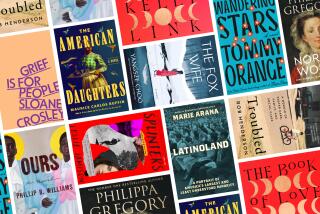FOUR LETTERS OF LOVE.<i> By Niall Williams</i> .<i> Farrar, Straus & Giroux: 258 pp., $23</i>
âWhen I was 12 years old, God spoke to my father for the first time. God didnât say much. He told my father to be a painter and left it at that.â
If only he had. Niall Williams has begun his Irish romance with a nicely bitten-down sentence. A wild horse needs a tight rein, and the twin horses of Williamsâ novel--two stories that converge--have a propensity to prance and foam. But instead of shaping their gait, Williamsâ prose hoots and blows in their ears until they have torn not just a passion but themselves to shreds.
In the first story, William Coughlin, a Dublin civil servant, throws over job and family to become an itinerant painter in the west of Ireland. His wife kills herself. His son Nicholas follows him and nurtures him and, after Williamâs death in a fire, seeks out his last surviving painting.
The second story, told in alternating chapters and set on an island off Galway, depicts the darkness that comes over the family of Muiris, the local poet and schoolteacher. His son Sean, a brilliant musician, suddenly falls dumb and paralyzed. Isabel, his beautiful, spirited daughter, is smitten with Peadar, a porcine Galway shopkeeper, and marries him.
Nicholasâ pilgrimage takes him to the island, where his fatherâs painting hangs in the schoolhouse. Muiris had won a Gaelic poetry competition and the painting was the prize. Now, after all the travail, everything mends and remedies everything else: Nicholasâ search, Seanâs silence, Isabelâs passion.
There is some charm in the double story, particularly in the authorâs strange but moving portrait of William. Early on, we see him through his sonâs eyes, living his routine life, coming home at night, putting on his cardigan, reading the paper. He grows gaunt, though; his hair turns white and falls out; his face is cut with sorrow lines. Something has to give. Until God speaks, the pent-up wildness is confined to Williamâs annual New Yearâs bathe in the Irish Sea. âI hold his towel,â Nicholas relates in a phrase of quivering balance, âand he walks his high frailty into the sea.â
Williamâs obdurate persistence in the midst of his familyâs ruin is poised on a fragile line between inspiration and destructive mania. He knows he has brutally torn away his wifeâs loving peacefulness and, eventually, her life. He works with despairing doubt as well as conviction; he embraces the despair as part of his mission. His first canvases are violent daubs; his later, more expressive work is all but entirely destroyed when he puts his canvases in a barn and the cows tear them apart.
The bookâs finest sequence tells of Nicholas secretly following his father on a trek through the west country to the coast and of the companionship that springs up when he shows himself. They swim together, William paints each day till nightfall and before they go to sleep in the dunes, he listens transported as Nicholas does his schoolboy best to recite Virgil in Latin. William hears a divine confirmation of his struggles, as if God were speaking to him through the Latin cadences.
The âas ifâ is important; it draws a line of art that is missing from other parts of the book. Elsewhere God intervenes directly; so do ghosts, ascending souls and angelic messengers in the form of swooping birds and a plague of houseflies. They act as cheerleaders for the intensity that the authorâs use of character, incident and prose falls short of supplying. His book is incessantly miracle-driven.
Having some experience with such things, even the Catholic Church has come to exercise the greatest caution in recognizing miracles. They risk interfering with the mysteries of human individuality and freedom. In literature, they run the same risk.
It takes extraordinary art, a coolly steady hand and, usually, a dose of skeptical humor to make them work. (A Gabriel Garcia Marquez is not found every day, though his imitators are.) Without these, belief is strained by the authorâs summons to believe. Worse, the characters are flattened and diminished. By definition, a deus ex machina emerges not from a person but from a machine, perhaps an attractive machine: a music box or box of the winds.
There is music in the authorâs box, but many winds as well. The island story of Muiris, his wife, Margaret, and his children has its pleasures, but it lacks much that is distinctive except for a few of the aforementioned miracles and a spume of language. Muiris, blocked poet and alcoholic schoolteacher, and Margaret, stricken in her illusions, are unremarkable. As for the musical Sean, a readerâs imagination has little to feed on when offered a child prodigy struck down as soon as met and only recovering--by miracle--at the end.
There is a little more savor in Isabel. Her time as a rebellious boarder at a convent school is barely a genre sketch, and her meeting with the amorous shopkeeper, Peadar, and her subsequent marriage and disillusion are as ritualistic as a folk tale and not so fresh.
But there are moments of persuasive insight. Isabel is more engaged by Peadarâs initial ardor and his schemes for luring her out of the convent than she is by the man himself. It is only after she makes a move toward him, instead of vice versa--she sneaks to his pub to find him--that she is smitten. It takes her own action to inflame her.
Williams uses language, as he does his miracles, to adorn a story which, had he trusted it more, might have had more resonance. Much of the time he shows little curiosity about his characters; they serve largely as prose opportunities. Apart from a section or two, and a few stellar phrases, it is garish prose, sometimes ludicrously so. Adjectives and images flap above the sentences like--contagious, this--gulls following a ferry.
The sublime, whether of concept or imagery, can grow only gradually and from below. To decree it is useless in writing and, no doubt, in life. As the spiritual puts it: âEverâbody talk about Heaven ainât goinâ there.â
More to Read
Sign up for our Book Club newsletter
Get the latest news, events and more from the Los Angeles Times Book Club, and help us get L.A. reading and talking.
You may occasionally receive promotional content from the Los Angeles Times.







